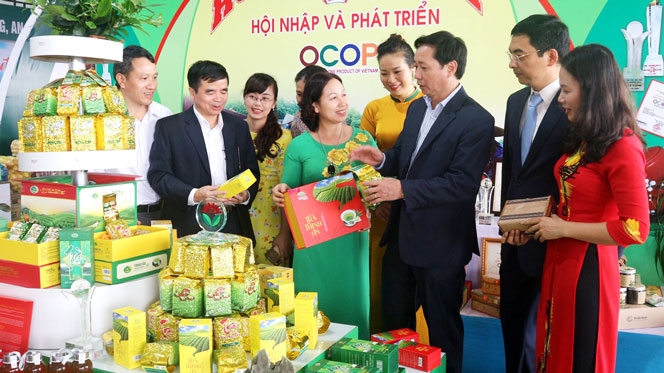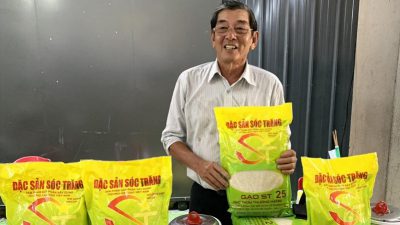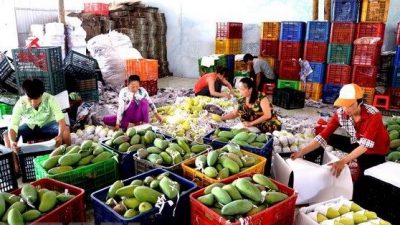
|
According to the Ministry of Agriculture and Rural Development, after three years of implementation, the “One Commune, One Product” (OCOP) programme has contributed to restructuring the agricultural sector, improving production value and promoting the agricultural product brands of many localities. In the coming time, there is a need to improve product quality while promoting innovation and creativity in product development in order to attract more domestic and foreign consumers. |
|
Encouraging results in implementing OCOP programme Although the OCOP programme in Hanoi was implemented in July 2019, later than other localities in the country, by the end of 2020, as many as 1,000 products from 72 enterprises, 82 cooperatives and 101 business households in the city have been recognised as OCOP products. According to the Vice Chairman of Hanoi People’s Committee Nguyen Manh Quyen, the OCOP programme has created jobs for more than 5,000 workers in rural areas with a stable monthly income of VND5 to 7 million each. Dong Thap province is also another locality having gained notable success in implementing the OCOP programme. Since it was launched in the province in 2019, 161 local products have met the three-star and four-star standards, four of which have been submitted to be rated at five-star standard. Leaders of Dong Thap province have held this to be a positive signal, showing that local people and enterprises have a clearer understanding of the significance of the OCOP programme. The positive results have also created a firm foundation for the province to develop a plan for the second phase of the programme, thus realising its target of building new rural areas. Despite being a mountainous province with many difficulties, Bac Kan has found ways to promote the advantages of its OCOP Programme and turn OCOP products into a key factor in building new rural areas. By the end of 2020, 29 disadvantaged communes in the province have developed OCOP products. Vice Chairwoman of the Provincial People’s Committee Do Thi Minh Hoa said that the successful implementation of the OCOP Programme in the province has helped create more jobs and raise incomes for local people, thus contributing to poverty reduction, with the poverty rate in the province down to 18.51% in 2020 from 24.53 % in 2017. As summarised by the former Minister of Agriculture and Rural Development Nguyen Xuan Cuong, after its three-year implementation, the OCOP Programme has created many breakthroughs in raising the awareness of both people and businesses. The figure of nearly 4,500 products with three-star (and above) ratings demonstrates the success of the first phase of the programme, he stressed. Localities nationwide have so far organised 66 OCOP fairs to promote their OCOP products. (Photo: NDO) Creating momentum for OCOP A report from the Ministry of Agriculture and Rural Development said that localities nationwide have so far organised 66 OCOP fairs with more than 10,000 booths installed and over 1,000 business contracts and agreements inked. Nearly 360 businesses have had their products distributed at the supermarket systems of Central Retail, Saigon Co.op, and Mega Market as well as in local supermarkets, contributing to elevating their brands while helping domestic and foreign consumers access high-quality products. In Ha Giang province, local authorities have spent nearly VND 40 billion to support the local implementation of the OCOP programme in the 2018-2020 period. In addition, the province has also organised training courses and trade promotion conferences to advertise local OCOP products. To date, many OCOP products in Ha Giang have been on sale in supermarket systems across the country. Local authorities’ support in developing OCOP products have become a driving force for production facilities to expand their production scale. According to Hoang Thi Tan, Director of Tam Tra Thai Cooperative in Tan Cuong Commune, Thai Nguyen City, who whose two tea brands have been recognised as four-star rated OCOP products, the cooperative has invested in developing modern and safe production lines meeting VietGAP and UTZ standards. Currently, the cooperative is affiliated with and owns 39 hectares of tea plantations, which have an annual output from 15 tonnes to 20 tonnes and a total value of around VND10 billion. The cooperative has generated jobs for 29 employees and many local seasonal workers with a monthly salary from VND4 million to VND5 million each. Although many effective models and initiatives have been put forward, most have focused on developing local key products rather than building new products which could stimulate the growth of local raw material outlets and traditional crafts workshops. Therefore, it is necessary to work out further breakthrough mechanisms to promote the OCOP programme, contributing to boosting economic development in rural areas. Source: Nhan Dan Online |



